On the hunt with a band of Indonesian whalers.
At 7 a.m. the waves were still pummeling the rocks. Hieronymus glumly passed on the news: No hunt today. The sky was slung low and stormy over the village as we prepared for another day aground. Down on the beach, the spotters sat idling, smoking cigarettes rolled in palm leaves and gazing out to sea like they were waiting for a bus. Something bus-sized, at least.
In Lemalera, everything faces the sea. All paths end up on that black sand strewn with rocks and bones and lined with thatched huts, long and narrow, each revealing the pointed bow of a canoe poking out at the water like an audience of sea turtles.
Hieronymus found me drifting through the village after breakfast.
“It’s very strange,” he mused.
“What is?”
“When you smell the blood of a whale, it smells like human blood. That’s why I have never tried it, because of the smell.”
Hieronymus—Hero for short—had gray eyes, Timor features, and a cropped military moustache. Around forty-years-old, educated and unmarried, he was a self-employed travel guide. Hero had a troubled air and spoke decent English in a sullen monotone. He was superstitious, always twirling his ivory bracelet and fingering the orca’s tooth he carried in his pocket.
We stopped beside the yard of a shack, where bamboo racks in neat lines were hung with drying, reeking flesh. Shark, manta ray, dolphin, whale shark, turtle, tuna, marlin. Hieronymus pointed to something that looked like a meter-long slice of yellowish-black eggplant. Whale meat. Beneath it, baskets were collecting the viscous oil that dripped down and solidified in the sun.
I had met Hero four days earlier in the port town of Maumere, the last settlement of any note on the swish of volcanic islands that comprised East Nusa Tenggara in Indonesia. Bali was a fading memory 500 miles to the west. Java much further still.
As I waited for my pack at the airport’s luggage carrousel, Hero mumbled a sales pitch. He described an island where men hunted whales with bamboo harpoons and spindly canoes. He would take me to this lost world via land and water as he had taken other travelers and journalists, help me interview the whalers (he spoke their dialect), and, best of all, facilitate a hunt with them. It felt like being offered the chance to go to Skull Island in search of King Kong, but these creatures were real, and I’d get a story out of it. I was never going to say no.
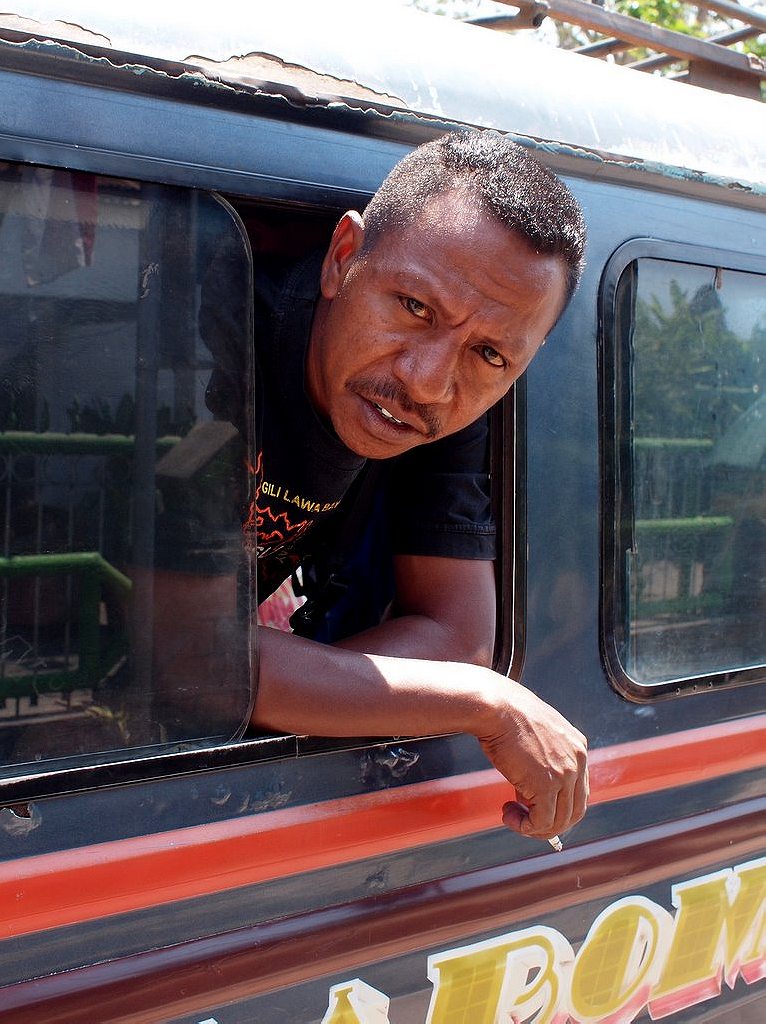
The journey to Lemalera took two long days, traversing islands forested in palm trees, then riding ferries that joined the dots between land and shore.
“If they see a whale when you are on the boat, you better know—they will try to kill it,” Hero warned grimly as we sat on an overloaded tub that chugged between jade volcanoes. “They do not care that you are there, even if it takes many hours. Or days.”
Hero had a talent for doom-mongering, which, given the nature of his travel guiding, meant he could exercise it a lot. After the third day aground in Lemalera, I asked Hero if he thought we’d ever get to join a hunt.
“Don’t know. It depends.”
“On the weather,” I pre-empted.
“And on you, maybe.”
“Excuse me?”
“Maybe you do something bad. Have something bad in your heart. You need to prepare yourself. Here in the village, if they don’t trust you, and something happens in the middle of the sea, you’ve got big problems.”
As I waited for the hunt I explored every inch of Lemalera. The village sits on the southern shore of Lembata Island, choked by steep mountains and impossible to farm. But it does have one unique resource—the Sawu Sea. Lemalera looks out on to this ominous gray juncture of the Pacific and Indian Oceans, where trenches a mile deep teem with giants. Fourteen species of whale migrate past the island on powerful currents, including the mightiest of all, the blue whale. Sharks, rays, and smaller cetaceans, such as dolphins, come here to feed; sea turtles ride the currents beneath.
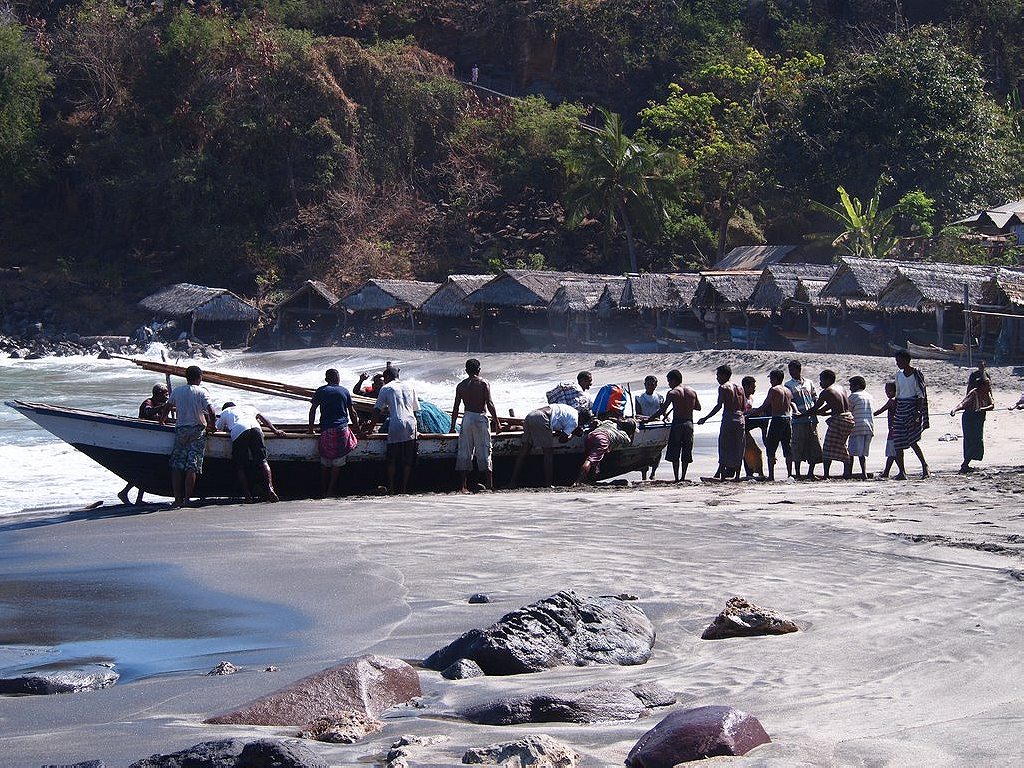
For generations, family clans have hunted on the Sawu Sea in wooden canoes with bamboo harpoons and woven palm sails. The creatures they kill are eaten, and sometimes the meat is bartered with villages inland for fruits, grains, and other goods. Occasionally, when the people of Lemalera need to raise cash, Hero told me, whale meat is hauled overland to Lewoleba, the only town on the island, and sold there. Another more recent source of income was tourism. I wasn’t the first to come here looking to catch a ride on a whaling boat and, if the weather ever let up, I’d be paying for the privilege—about $10.
On our third evening in Lemalera, Hero took me to meet Ignaceus, a retired whaler. Bony and wide-eyed with scrubby hair the colour of sharkskin, he was an aging sage of the sea and had killed his first whale more than 40 years earlier.
“I was scared,” Ignaceus told me. “I had to jump into the water otherwise the whale would swim away. I had to jump. All the crew urged me to jump. So I jumped.”
I thought “jump” was a mistranslation, but Hero explained: The harpoon isn’t thrown, exactly; the hunter launches his whole body, while clutching the harpoon, into the water, bringing the sharp end down upon his target—under the fin if it’s a sperm whale—using all his weight and momentum. The risks are considerable. The harpoonist must avoid the thrashing tail and the boat’s keel, motor blades, and ropes.
“I was hurt once,” Ignaceus said, exhaling cigarette smoke. “The rope caught around my leg, but luckily I had only speared a manta ray. A whale would have taken me for certain. God didn’t want me to die that day.”
As the sun dipped below the palms, the ever-present reek of spoiling flesh was masked by the gentler scents of a tropical evening. We strolled across the village to the house of Ignaceus’ son, Joseph.
About 40, Joseph had a dark-eyed, Clint Eastwood swagger about him. Wearing just a pair of shorts, he was built like a gymnast, knotted and lean. He invited Hero and me to sit on stools fashioned from whale vertebrae. Colossal bones were piled up in man-sized stacks. His wife served us syrupy palm wine in plastic bottles.
Joseph had harpooned whales since he was 16. He’d killed over a hundred. Sperm whales, mostly.
“Do you worry about getting hurt, or killed?” I asked.
“Feelings are very important when you want to catch the whale. If you are frightened, you will lose it. When I’m out on the boat, all I’m thinking about is what I can catch and bring back to the village and to my family. I’m always concentrating on the sea—whale, manta, dolphin, it doesn’t matter what. I must bring something back.”
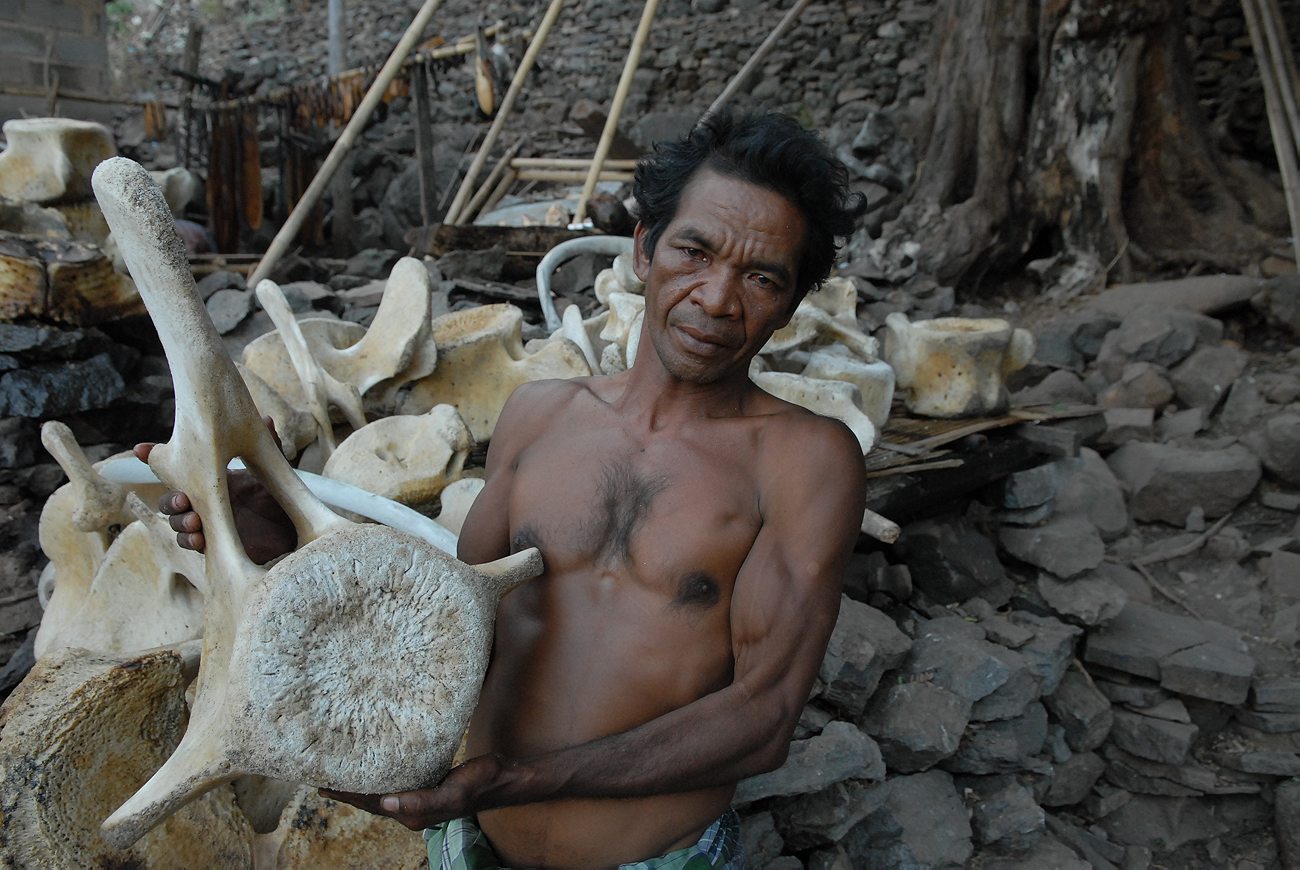
In Lemalera, if a boat brings back a dolphin, shark, or turtle, for example, the meat belongs to the crew. But if a whale is killed and floated back to the beach on the tide, it is shared among the whole village. Whale meat, Joseph said, is the favorite of everything they catch. They salt and dry the meat and eat it with rice or corn.
What about blue whales? Joseph answered that it was forbidden to kill them, a rule that has existed since before his grandfather’s time. They are too big and will dive when harpooned, dragging a Lemalera canoe and its crew down with it.
“Also,” Hero added, under his breath, “they cannot eat the meat because even if they cook it for hours it is still red like fresh blood.”
Inside Joseph’s house, a set of framed photographs, taken by a Japanese traveler, were displayed on a shrine. In one, Joseph was pictured leaping into blood-red water. Beside it stood a faded image of the Virgin Mary. On the wall above the family bed was a portrait of Christ.
“If I dream about something good,” Joseph said, “it means I will have good luck on the sea. If I have a bad dream, I will not go on to the water. If I am feeling unwell I will not go on to the water. If my wife is pregnant I will not go on to the water. All bad omens.” He looked at me for a second, put a cigarette in his mouth, and we stepped back outside.
On the beach the next morning, a fishing boat had managed to go out before dawn. Excitedly, Hero proclaimed that today was the day: The hunt was on.
It wouldn’t be Joseph’s clan crewing our boat. Another group was going out: four men, plus myself, Hero, and the only other non-natives in the village, two Italian travelers who had arrived a day earlier. Together with the spotters, we helped the crew haul their painted canoe from out of the hut and across the sand. On the sea the crew paddled furiously over the first volley of waves before kicking a small outboard motor into gear. And then, at last, we were clear, afloat and cruising over the Sawu Sea.
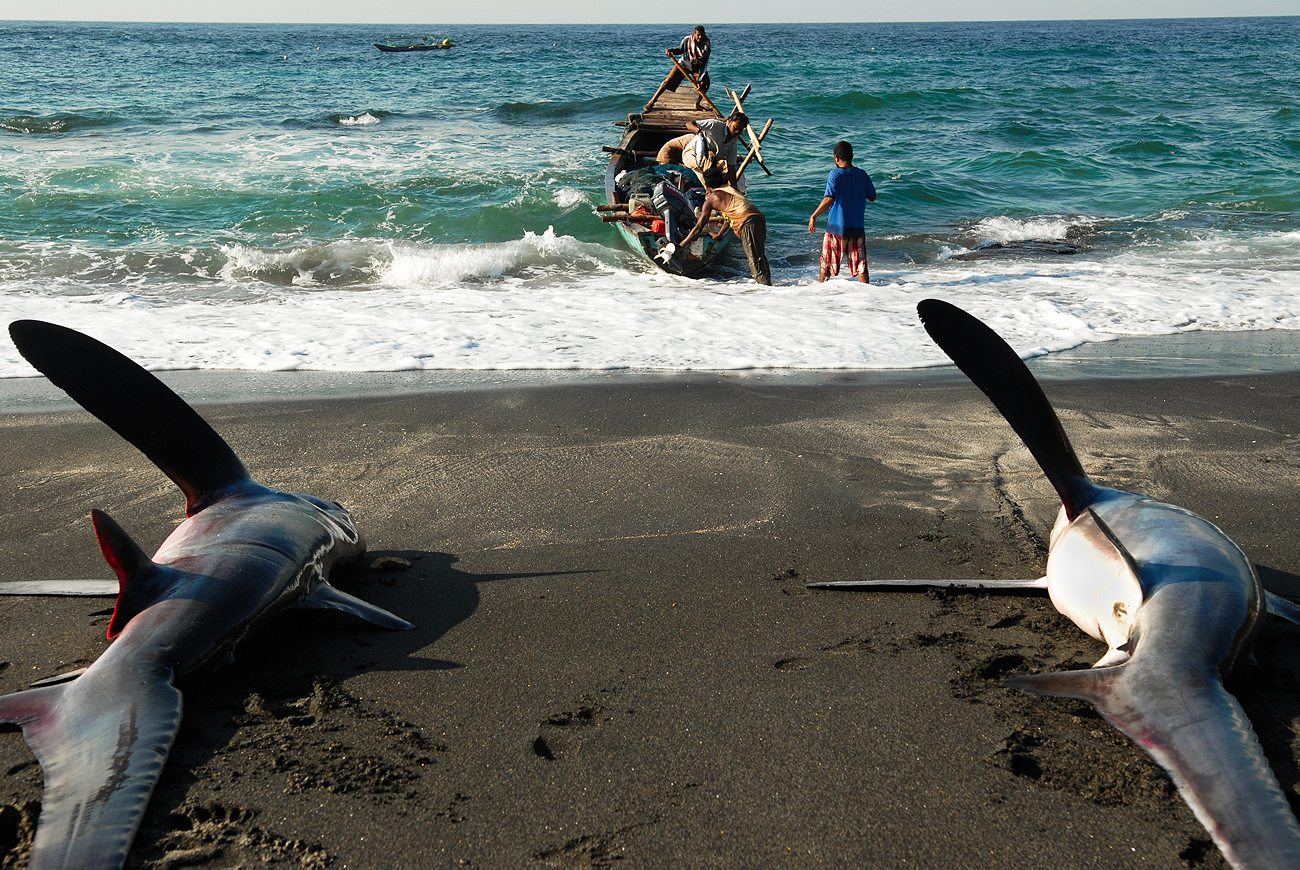
Ondu was our harpoonist, about ten years younger than Joseph, wearing a checked shirt and yellow baseball cap. He stood on the plank over the bow, with Opu, his assistant, sitting behind him. Opu was the guy who looked out for the harpoonist’s safety. He managed the ropes and shouted instructions to Nyamin, the captain, who sat at the back controlling the rudder and outboard. The other crewmember was Yan, the youngest. His job was to bail out water with a wooden bucket.
Lemalera shrank to a blur as we putted away from land. In the other direction, gulls circled low and lazily over a patch of water, and immediately we spotted the forked tails of tuna cutting in and out of the sea. Ondu fastened the spike to the end of his bamboo harpoon and we motored towards the tuna, when suddenly, the ocean erupted with dolphins, twenty or more, gleaming gold in the sun as they looped out of the water in twos and threes.
Ondu pointed wildly and yelled at Nyamin, who threw the rudder about, but with so many targets we flip-flapped ineffectually and they all dispersed. When the sea was calm, Ondu dropped his harpoon and Nyamin killed the motor.
A few miles from land, we were drawn towards a dark object floating in the water. It turned out to be a dead pig floating on its side, covered in a fuzzy black hide like the kind some of the villagers kept in pens. Hero said it must have died of a sickness and got dumped out here. We watched it for a moment. As omens go, it didn’t feel like a good one.
The hunt resumed. We gave chase to a small school of dolphins, hopelessly outpaced in our lumbering canoe with its 25 horsepower motor, but the dolphins seemed to axel, hop, and double back on themselves just for the sheer joy of it, and that gave Ondu a chance. He crouched on his platform, toes gripping the salty wood, body coiled and elastic, and raised the huge harpoon straight up.
As we bore down on our prey Ondu angled it forward like a lance. Everyone but Ondu was yelling as we turned to port, starboard, port again, the dolphins diving across our bow and reappearing, only to dive once more. Then in a heartbeat the attack came. Ondu was gone, off the bow of the boat and reappearing at the stern in a single movement, baseball cap somehow still atop his soaking frame. He had missed. Heaving himself on board, he cursed at Nyamin on the rudder.
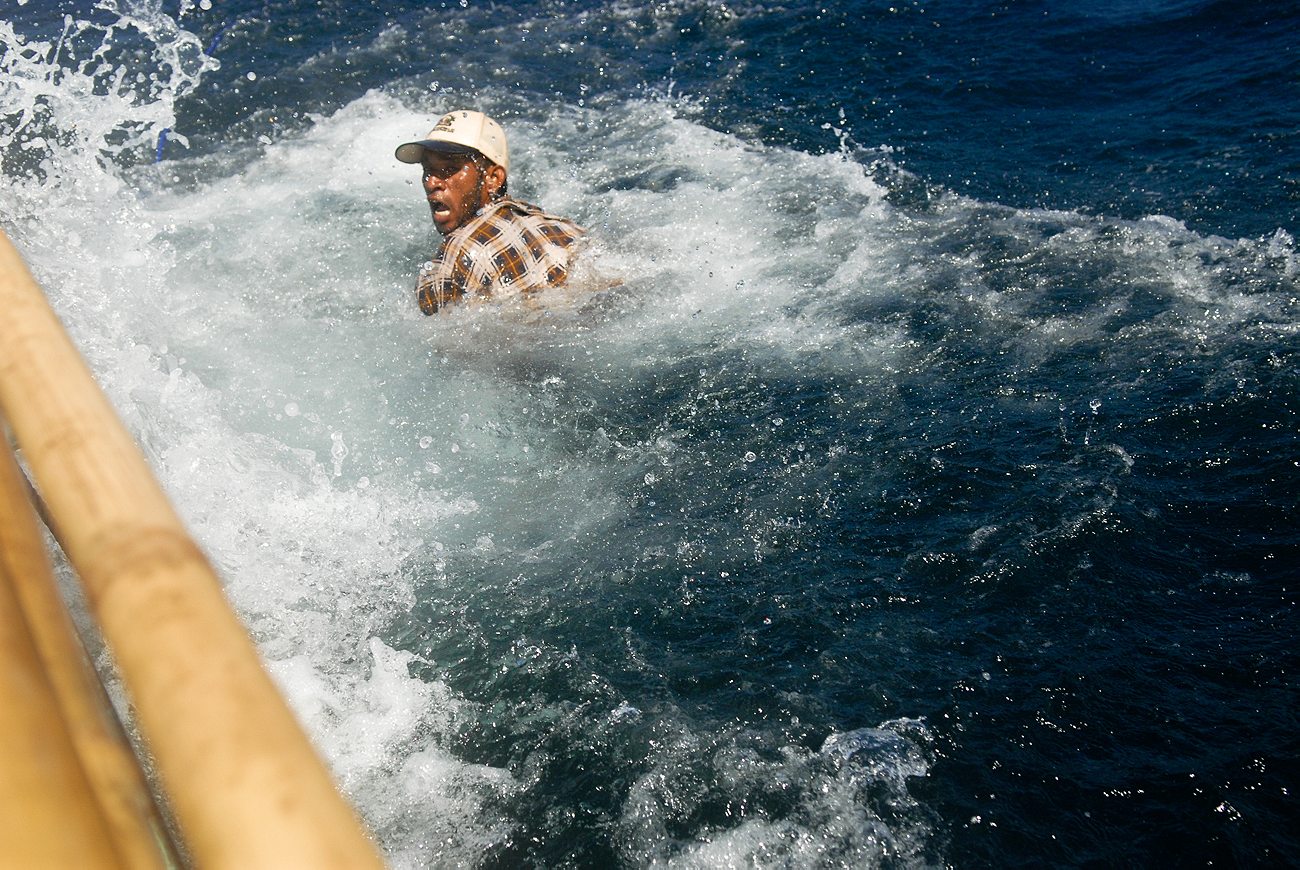
We were far out to sea now, and there were no more circling gulls or giveaway splashes. The air was still and the silence heavy. The waves rolled nauseatingly as the sun beat down. We chugged south, keeping the shore to port side. The crew was still ruing the one that got away.
In Lemalera, the incantation on the lips of every spotter, the noun that rolls seductively off the tongue and sets a whole community in motion, is “Baleo, baleo!” Whale! It was the cry I’d come here for, but also dreading as I grasped the deadly reality of it all. So when it finally came it took me a few seconds to process it. Hero grabbed me by the shoulder, pointing into the distance. The rest of the crew took up the cry. “Baleo!” Shielding my eyes from the sun I looked again, and then saw it too. A foamy exhale, shooting up into the air about 500 meters away. A whale had breached the surface.
There was wild excitement in the boat, and I frantically begged Hero to translate. “Not baleo, not baleo,” he kept saying. “Kararu!” That was the new shout. Kararu! Baleo is the Lemalera word for sperm whale, their favored prey. Kararu is the big one. The blue whale.
Suddenly, behind us on the starboard side, where no eyes were trained, a disturbance broke the water and we wheeled about to witness a torrent of spray just 60 meters from our tiny canoe, and then another, smaller cascade, behind it. Kararu! Kararu! Two more blue whales, a mother and an infant. Their great, gnarled bodies undulated just below the waves, dwarfing us. We watched, awestruck. A final spray, and the pair descended, the sea ironing out all trace of their immense presence.
Everyone on the boat was thrilled; even Hero was beaming. The Italians and I exchanged hugs. But for the hunters, this was no whale-watching cruise. The telltale sign of gulls circling on the horizon led us to yet more dolphins, already being chased by a second Lemalera canoe.
The graceful routine of the dolphins was now becoming familiar, but this time a single animal broke away from the main troupe, and our boat gave chase. Once again, Ondu’s lance was tipped, and then he vanished into the water, seeming to materialize in the same second at the stern like a conjurer’s trick. This time, his rope was taut. As Ondu clambered back aboard, shouts rang out.
Our canoe didn’t stand a chance
The line was hauled in, and our dolphin, a handsome juvenile about a meter-and-a-half long, came into view. The wound was deep, and part of its stomach was showing. Another harpoon was jabbed into its back, and then, finally, its desperate face was hauled up against the hull of our boat, and smashed with a plank of timber.
The crew was jubilant; Opu, Ondu’s assistant, back-flipped into the sea triumphantly, like a child at a swimming pool. The dolphin was dumped between me and Hero. I felt numb, and grateful for the noise of the motor drowning out the animal’s reedy rasps when at last we puttered away.
“It’s very rare to get a dolphin,” Hero leaned over and said. “We have good luck today.” His uncharacteristic cheerfulness felt jarring, given the circumstances. And the hunt wasn’t over yet.
More gulls led us to the biggest pod of dolphins so far, easily more than a hundred in the water, surfing a giant swell that came at us while we pursued another group, with yet more appearing around and about. Further away, another group of dolphins leapt majestically, at least ten feet above the surface, as if the whole show was a private performance curated especially for us. This time, though, the dolphins seemed fully aware of our intentions, as if they finally understood that we were playing for keeps. They toyed with us, led us a merry dance, but our canoe didn’t stand a chance.
The tail of a marlin encouraged one more half-hearted pursuit, but by now, after several hours at sea, the crew was tired, and so down went the harpoon and out came the cigarettes. Ondu sat on his plank, ankles trailing in the water as Nyamin guided us back towards shore. The dolphin, finally, was quiet.
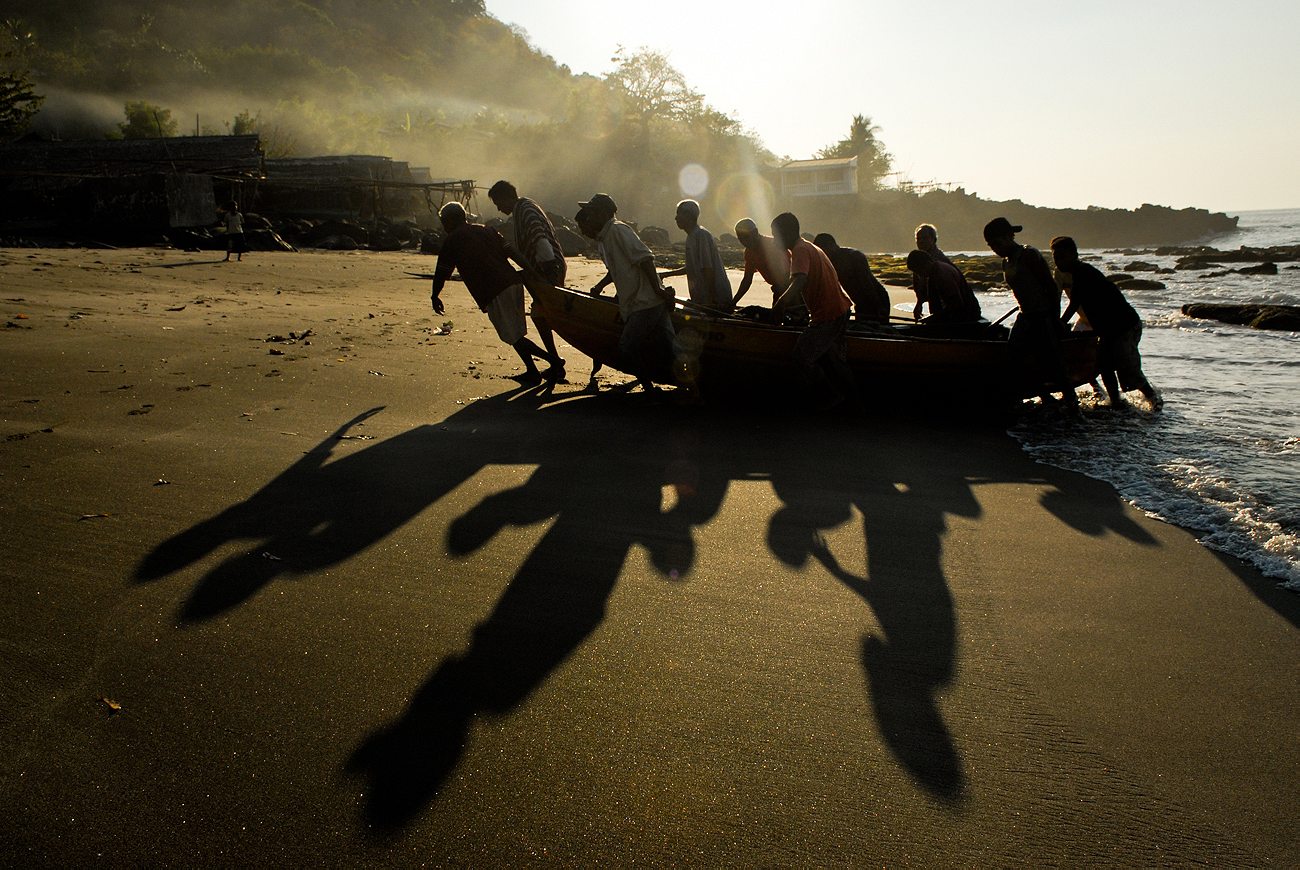
Back in the village that evening, we drank palm liquor and toasted the hunt, but mostly the fact that we were safely on dry land. Hero was in high spirits; he knew he had delivered. Days like today don’t happen often, he told me. Other travelers had hung around much longer and never witnessed anything like that.
The tremendous multitudes of dolphins that surrounded us in the water, and the effort and skill it took these men to catch just one of them, without the aid of nets, radar, harpoon guns, life-jackets, or even a simple pair of binoculars, seemed to make it a just return. To these god-fearing, close-knit islanders, their catch, whether dolphin, shark, or whale, was simply pounds of fish in the cooking pot.
From what I gathered talking to the villagers, the whalers of Lemalera killed between three to 25 sperm whales a year. The International Whaling Commission does permit whaling among certain of its members—the Makah tribe in the state of Washington, for example. What’s important is that they can demonstrate “strong community, familial, social and cultural ties relating to a continuing traditional dependence on whaling,” and that their actions won’t impact global stocks. It sounded like the whalers of Lemalera would fit the bill, but since Indonesia wasn’t a signatory of the IWC it was a moot point.
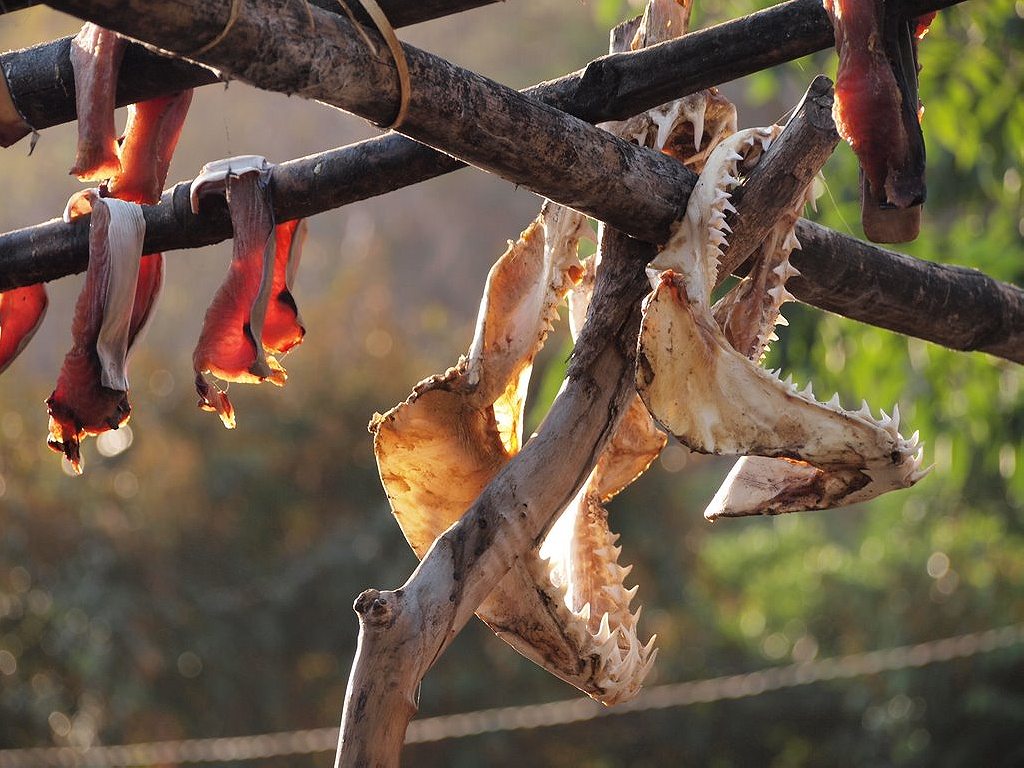
That we participated and paid for the privilege to see it killed was more problematic. Only a handful of boats went out that day. Would our crew have risked it without our $40 coming their way? Had I paid for that dolphin’s life? And what if we had seen a sperm whale and gone for it? We might still be on the boat, even now, in a sea of blood.
The next morning, Hero and I journeyed back the way we had come, over land and sea. The same ferry strained under its cargo of passengers and motorbikes. We didn’t talk. Hero’s duties were fulfilled, his bill paid. He was already thinking about the next plane coming in, and I just wanted to head west.
Back in Maumere we encountered an Italian tour guide in the guesthouse, leading a small group of wealthy older travelers across Flores. He was tall and weathered, a seasoned campaigner with long silvery hair and the shadow of a beard. His group was due to travel to Lemalera the following morning, not by boat but by light aircraft. Surprised, Hero said it was the first he had heard of such a thing.
The Italian was assisted by two local guides from an international operator in the east of Flores, brandishing iPads and dressed in crisp white polo shirts. They had a profitable line taking tourists to the islands of Komodo and Rinca, Hero said, admiringly. In East Nusa Tengarra, it’s dragons, not whales, where the money is.
The two guides flashed Hero a condescending smile. It seemed to me like they looked down on my guide, this lone opportunist from Maumere with his orca’s tooth and provincial superstitions. So I was pleased for Hero when that evening he recounted the story of our adventure. To show the size of the blue whale he ran from one end of the porch to the other, arms outstretched theatrically, shouting and laughing. Engrossed, the guides hung on his every word. We all did. It was Hero’s moment.
Towards midnight, only the dogged old Italian tour leader remained. He drained his beer and sighed as the crickets chirped, as if nicely satisfied with the evening’s swashbuckling stories and the adventures he had in store.
“Monde grande,” he said, then looked at me and switched to English. “The world is big, and I am small. And that makes me happy.” With that, he pulled his considerable frame out of the chair and trudged off to bed, shoulders stooping. I sat there thinking about dolphins, hopping away into the darkness in perfect unison, their numbers thinned by one.
[Top image by Fulvio Bugani]